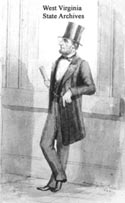|
When President Abraham Lincoln received the statehood bill on December 22, 1862, he was
deeply distressed. He asked the six members of his cabinet for written opinions on the
constitutionality and expediency of admitting West Virginia to the Union, but they divided
evenly. Lincoln had supported the creation of the Reorganized Government of Virginia, but
recognized the statehood bill as being forced upon him by Radical Republicans in their effort to
use the war to end slavery. Lincoln recognized the questionable nature of the state's creation,
noting that "a measure made expedient by a war, is no precedent for times of peace." Despite
reservations, on December 31, 1862, Lincoln signed the bill
because he could not afford to lose the support of loyal West Virginians. In his opinion, he wrote:
"Doubtless those in remaining Virginia would return to the Union, so to speak, less reluctantly
without the division of the old state than with it; but I think we could not save as much in this
quarter by rejecting the new state, as we should lose by it in West Virginia. We can scarcely
dispense with the aid of West Virginia in this struggle; much less can we afford to have her
against us, in Congress and in the field. Her brave and good men regard her admission into the
Union as a matter of life and death. They have been true to the Union under very severe trials.
We have so acted as to justify their hopes; and we can not fully retain their confidence, and
co-operation, if we seem to break faith with them."
|

President Abraham Lincoln
|




